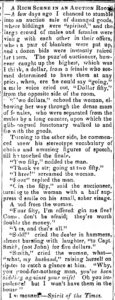Los Angeles, CA – On Tuesday 13th July 2021, the National Auctioneers Association’s Board of Directors released a landmark statement to their members announcing the adoption of a new position on data ownership, and the potential threat marketplace technology providers pose to the global auction industry:
“The National Auctioneers Association shall recommend exclusive data ownership by auction entrepreneurs in order to promote their own brand, drive traffic to their own websites and create their own online marketplaces. The National Auctioneers Association is promoting the accepted best practice of enabling and empowering auction entrepreneurs for success and long-term viability in the auction industry. The National Auctioneers Association will promote and educate auction entrepreneurs on the reasons for this best practice and how to implement and market this practice. What follows is the continuation of the conversation encouraged by this motion.”
The statement addressed and reflected the concerns of auctioneer entrepreneurs throughout North America who responded to a survey of members (conducted by the association) on data ownership and third-party technology providers. The results of the survey stated only 38.3% of the respondents were confident that their third-party vendor did not market its services, solicit consignments from the public, or market other auction companies’ auctions to their bidders. It suggested that a future where employee agents of a marketplace replace auction entrepreneurs was easy to envision.
Adam Alexander, CEO of Bidpath, commented on the statement: “The National Auctioneers Association is the largest association of professional auctioneers’ in North America, and we are delighted to see the statement they have issued which supports the business model and philosophy on which we have built Bidpath. We are proud to support and comply with the NAA’s best practice guidance for auctioneers in the area of data ownership and to provide auctioneers with a viable alternative to marketplace technology.”
The full white paper released by the association can be found below, or on our website.
National Auctioneers Association Statement – Auction Marketplaces, Auction Data, and The Impact
According to a recent survey of the National Auctioneers Association (NAA) membership1, 70.4% of NAA members use a third-party vendor to manage auction bidder, sales, or seller information. Yet, only 55.4% of the NAA members understand how that third-party vendor handles that information2.
In July of 2021, the NAA’s Board of Directors adopted the following position: The National Auctioneers Association shall recommend exclusive data ownership by auction entrepreneurs in order to promote their own brand, drive traffic to their own websites and create their own online marketplaces. The National Auctioneers Association is promoting the accepted best practice of enabling and empowering auction entrepreneurs for success and long-term viability in the auction industry. The National Auctioneers Association will promote and educate auction entrepreneurs on the reasons for this best practice and how to implement and market this practice. What follows is the continuation of the conversation encouraged by this motion.
Auctioneer Business Models
Generally, an auctioneer’s business model will take one of two primary paths. The traditional course is to pursue a career in the profession and build a business primarily to support themselves and perhaps one or two others. According to data from the NAA, 63% of auctioneers choose this route and have four or fewer employees. Many auctioneers thrive in this business model as it integrates into their lives and becomes a part of their identity. Their success depends mainly on their direct, daily efforts.
Some auctioneers choose to make additional investments and take on added risk, which often requires changes to their business model. These changes can include hiring non-family employees or contractors and empowering them with greater decision-making authority. One of the chief value propositions in this business model is bidder and buyer data, seller contacts, brand awareness, and marketing reach. In terms of data and branding, individual decisions auctioneers make will impact their sustainability and success.
Direct-to-Consumer vs. Marketplace Selling
Before the advent of online bidding technologies, the auction profession was a direct-to-consumer profession – the auctioneer sold directly to consumers through their auctions without a middleman.
Selling direct-to-consumer created tremendous brand awareness for the auctioneer, especially locally and regionally, before the advent of social media and more advanced marketing methods.
Following the online selling trends of retailers in the mid-1990s, auctioneers began to seek out
third-party technology companies to provide online auction services, increasing the auctioneer’s reach outside local and regional audiences. As the value of auction data became apparent, these technology companies began to offer online solutions similar to marketplaces such as eBay and Amazon. These marketplaces enabled auctioneers to list their items and auctions alongside other auctioneers and share in the buyer pool. Marketplace solutions quickly became attractive to auctioneers for a variety of reasons:
● The quick and efficient ability to join the online retail world
● Reaching an established buyer base for assets
● The ease of selling new asset classes with low startup costs that adjust based on volume (per event fees, percentage of sales, et cetera)
● The minimal technical knowledge needed by auctioneers
As the technology evolved, third-party companies began to offer solutions where the auctioneer could benefit from the marketplace while maintaining a brand presence. These solutions may have been co-branded or individually branded to the auctioneer. As general technology costs decreased, auction software providers entered the market. These providers enable auctioneers to install software that runs on their website without sharing data with other companies or the technology provider. Generally, this technology is provided through a licensing agreement and paid regularly at a flat rate or fee.
Impacts on the Auctioneer
New and significant risks to auctioneers have materialized as technology has changed and technology providers have grown or adapted their business models. Only 38.3% of NAA members are confident that their third-party vendor does not market its services, solicit consignments from the public, or market other auction companies’ auctions to their bidders3. Further, only 45.8% of NAA members are confident they have user agreements and terms and conditions directly between their company and online bidders4. When coupled with the growing consumer privacy laws in the United States, this lack of confidence in third-party vendors has significant implications for the auction entrepreneur and the profession.
Like other industries, online marketplace providers have consolidated in recent years and now operate multiple marketplaces. Some have become publicly traded companies. As marketplaces grow in size, the stakeholders these marketplaces serve change. Initially, as a small technology company, the auctioneer is the most important stakeholder to the technology company. Once the marketplace establishes a large buyer pool (through its auctioneer clients) and brand equity, its need for the auctioneer can become less. This reduced need can give way to a marketplace agent or salesperson model working directly with the public. A significant consequence of marketplaces is buyer attachment with the marketplace brand rather than the auctioneer, fueling the loss of brand awareness of the auctioneer or auction company. A future where employee agents of a marketplace replace auction entrepreneurs is easy to envision and has already arrived in some asset classes (Zillow is one example where a marketplace switched to employee agents)
To see this at play in a retail marketplace, think about the last time you purchased something from Amazon. In reality, you were often buying from a smaller retailer that has their goods listed on Amazon. However, increasingly you are buying directly from Amazon who offers products that compete with the other sellers in their marketplace. Most consumers don’t think about the small retailer they purchased from on Amazon; they think about Amazon. The impact on Amazon sellers is the same impact on auctioneers that utilize
1 The NAA conducted the survey from February 25, 2021 to March 3, 2021. The survey had a margin of error of plus or minus 5 percent at a 95 percent level of confidence.
2 14.8% responded they don’t understand, and 29.8% responded I would like to understand better.
marketplaces – the complete loss of brand awareness by the buying public. For some auctioneers, this is acceptable as their brand is a secondary concern to immediate sales concerns. While some auctioneers feel insulated from these marketplace pressures, it is essential to be vigilant with your data and brand.
Conclusions
There are both risks and opportunities when choosing to utilize a marketplace solution versus a direct-to-consumer solution for your auction business. Auction entrepreneurs must give special attention to the significant long-term impacts of sharing bidder, buyer, sales, and seller data with third-party vendors of all types and especially marketplaces. For many auctioneers, the value of the
“instant bidder pool” provided in the short term outweighs any future loss of branding or loss of market share. Many auction marketplaces sustained auction companies through the pandemic. As the pandemic subsides, it is important to reevaluate decisions and consider marketplaces’ longer-term impact. These short-term gains and benefits come at the potential cost of the auctioneer’s long-term viability and entire value proposition.
Many auctioneers looking at the long-term impacts of marketplaces are moving at various speeds to retain complete bidder information control. This move often involves leaving marketplaces due to brand recognition loss and concerns about marketplaces’ data usage. While technology costs continue to decrease, the investment can be significant and remains a factor in making this change. As technological and knowledge demands on the auctioneer continue to increase, so do additional staff resources required to succeed. Marketing expenses typically seen as sell-through commissions and event fees must be converted to upfront software, programming outlays, and focused pre-event marketing campaigns.
Each marketplace solution currently available and those that will follow must be judged both on their stated values and observable actions. All companies, including technology providers, face consolidation and acquisition pressures. Auctioneers at every stage and in every business model must fully understand the short- and long-term consequences when making decisions regarding third-party technology vendors and marketplaces. These decisions will have lasting effects on the auction entrepreneur’s brand and value. Collectively, the effects endanger the auction entrepreneur’s independence and growth and muffle the auction profession’s voice.
3 31.0% responded yes their third-party vendor does market its services, solicit consignments, or market other auction companies’ auctions to bidders, and 30.7% responded I do not know.
4 33.6% responded that user agreements and terms and conditions are between the bidder and the third-party vendor, and 20.6% did not.
Contact
press@bidpath.com
+1 415 543 5825
26635 Agoura Rd
Suite 215
Calabasas
CA 91302
About Bidpath
Bidpath’s best in class auction management technology delivers sophisticated solutions to over 750 leading auctioneers, retailers and manufacturers in 27 countries across multiple markets and industry verticals.
Our feature rich auction software has been enabling clients to build their brand, increase sales revenue and maximize bidder participation for over 20 years. Bidpath technology provides a uniquely customizable suite of mobile cataloguing and auction management tools, and a fully-supported online bidding platform, enabling clients to host dynamic live, timed and hybrid auctions alongside eCommerce functionality from their own website, or online marketplace.
Bidpath provides competitive online bidding solutions for Commercial, Industrial and Fine Art auctioneers globally, as well as businesses operating in Insolvency, Recovery and Turnaround; Aerospace; Electronics; Consumer Returns; Mining and Automotive industries.
Our offices in the US, UK, Europe, South Africa and Australia service clients including Macy’s, Tennants Julien’s, RM Sotheby’s, GraysOnline, Marknet Alliance, Hindman, Car Next-LeasePlan, Cheffins, Iron Bound Auctions and Racehorse Trader.
Source: https://www.openpr.com/news/2334148/national-auctioneers-association-make-landmark-statement















